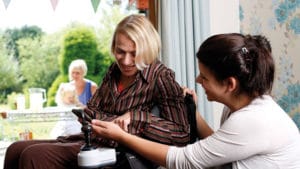
Needing help with personal care doesn’t mean that a person has lost their independence. Far from it, they can still lead a full and active life while receiving this type of support.
Individual preferences for personal care, as with other tasks too, are always outlined in a person’s support plan. In getting to know a customer as an individual, carers get to understand these preferences, such as the hygiene products they like to use and specific routines they like to follow.
Certain tasks, such as cutting nails, applying make-up and hair care, and changing incontinence pads, will all be detailed in the customer’s unique support plan, along with comprehensive instructions.
Top tips on providing personal care
At Helping Hands, we train our carers to put a customer’s dignity and personal preferences first, and to always focus on enabling independence rather than taking over on tasks.
Here are a few key things our carer training covers in relation to personal care:
- Focus on the individual behind the task – personal care may feel like another part of the job, but it’s important to see it as a very private part of a person’s daily routine.
- Stick to their routine and schedule – acknowledging that people have specific requirements or order for personal care is vital in being a compassionate and successful carer.
- Talk to the customer – never let any aspect of the task be a surprise.
- Learn to be flexible – people always have different preferences. Whereas some love a hot shower, others find the prospect daunting. Forcing an older person to take a shower isn’t necessary, there are other ways to ensure they are kept clean. Maybe ask if they’d prefer a wash or bath instead.
- Be prepared and organised – have their clothes or pyjamas ready, as well as a clean towel. Nobody likes to stand in the cold after a wash, shivering after leaving the warm water. Make this experience easier by quickly wrapping the individual in a fluffy towel.
- Create a safe environment – for example, remove any mats that may be hazardous in the bathroom, and always make sure the water temperature is not too hot or too cold.
Carers can sometimes be faced with stubborn or challenging behaviour when approaching the topic of personal care. This may be due to a condition the individual may be living with, or down to the simple fact that they feel vulnerable during the process.
In these instances, carers need to approach the task with kindness, reassurance and encouragement, and always in a professional manner.
Dementia and personal care
It can be common for someone who is living with dementia to be unaware of their own personal hygiene needs, sometimes not noticing changes in their own appearance.
Often, gentle encouragement is all that is needed. Maybe placing soap and a flannel out where they are able to find them, or casually mentioning a new hygiene product they might like. If they’re able to manage their own personal care themselves, this can be boost to the person’s self-esteem.
When it becomes apparent that extra support is needed, talk to the individual frankly but kindly about their personal preferences. Do they have a favourite shampoo or conditioner? Would they prefer to wash their hair or body first?
Be patient though. Anxiety and aggression when it comes to personal care can be purely down to feelings of shame or embarrassment. Give them space to calm down, allow them to make choices themselves and even demonstrate the task for them.
Clinical personal care
While catheter and stoma management may seem intimidating, Helping Hands offers full training in changing catheter bags and stomas as well as different types of continence pads.
As with all other personal care, the main focus should always be on creating a dignified and discreet environment where both individuals feel comfortable.
Carer training at Helping Hands
All carers at Helping Hands are trained in delivering personal care in a discreet and professional manner that’s most comfortable for their customers, while ensuring they provide support that is tailored to their specific requirements.
Carers are trained to understand that there may be some things that a person prefers to carry out themselves. Our carers will always give their customers the space and opportunity to encourage their independence wherever possible.
Building trust is essential, and a regular carer can build an ongoing relationship and rapport. That carer will promote independence as much as possible, allowing their customer to make choices themselves, such as what they’d like to wear, and keeping to the daily routines that are most important to them.
